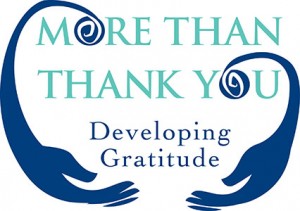Check out our latest news!
What do we hope for our children and society?
Most parents and child care-givers want their children to be “good people,” to care for others, and not to be too materialistic. The same qualities are good for societies – societies are better when the people who live in them are good to themselves and to others and don’t waste resources.
That’s what we’re trying to achieve – encouraging the development of positive characteristics, and trying to reduce materialistic values (people wanting more and more stuff, and just tossing out what they had before). Check out, for example, If kids won a million dollars…
How can we do that?
By encouraging the development of gratitude, and that’s what this site is all about.
What does it mean to be grateful?
Watch this video, to see a variety of ideas.
Berkeley’s Greater Good Magazine recently published a great article featuring our research about gratitude in different cultures.
It’s more than saying “thank you”
Though being polite is always good. Gratitude is not just about being happy for a gift or help received (although that’s nice), but about being happy about the person who provided that gift or help, and wanting to pay back that person in some way that will make him or her feel good. Gratitude in this sense is a way to build or strengthen connections among people.
We created a booklet for parents and teachers about gratitude.
Gratitude may also reduce materialistic values, by helping us to focus not on the gift we’ve just been given but on the person who gave us that gift. If we focus on the thing we’ve just been given, well, a new and improved version will soon be available, and so let’s hope for that one.
We will want more and more things and lack appreciation for what it took to get that thing or help (a parent working nights, a teacher taking extra time, a friend providing a helping hand).
If we focus as much on the people who gave us the gifts, or who helped us, we start thinking more about what we can do for them to thank them. Building or strengthening connections between people is sustainable—buying more and more and wasting more and more is not.
So let’s make a start by encouraging gratitude. This website is going to help us do that.
Rosanne Harriott says:
Thank you for supporting this research.
Ayse says:
Thanks for visiting our website and leaving a comment, Rosanne. We are grateful!
Adrian Sethi says:
Very great project in the way it is an unorthodox way of combating materialism!!
Jon says:
Thanks, Adrian! Kids are just bombarded with adverts aimed at getting them to want more and more stuff. So if we can encourage children to think more about the person who’s given a gift and less about the gift itself, maybe we can do a little to make children more focused on the people who do nice things for them and less focused on material possessions.
term paper assistance says:
This submit seriously helped me to to realized how
incorrect I found myself. Now We have details I can use to clarify my parent why this issue is very important.
I think when they look at it they can fully understand!
Jon says:
We’re very pleased to have been able to help. If you think that your parents need a little more persuading, I’ll be happy to talk with them. All the best, Jon
Mengyun Li says:
Thank you Dr. Tudge for letting me join this research!
Jonathan Tudge says:
Thank you, Mengyun–you’ve been enormously helpful!
Henry says:
I was thinking that appreciation, as part of gratitude, works both socially and environmentally. Socially, we let people know we are grateful for something they have given us. Environmentally, we aren’t just grateful for the gifts of nature, we take care of nature…if not, there’s no appreciation shown for the gifts of nature, just greed. Appreciation itself is a gift for the gift giver. Reciprocity as a virtuous cycle. Then there’s paying it forward, sort of ex-ante appreciation. Gratitude is synergistic, creative.
Jonathan Tudge says:
Hi, Henry,
I quite agree with you–appreciation is great, and true appreciation for nature should be accompanied by a desire to take care of nature. I just think that we need to be careful to distinguish between gratitude and appreciation; appreciation is far broader–we can appreciate many things. We can appreciate nature, our health, the fact that we’re better off than others, our parents and friends, our intelligence, and so on. If we don’t appreciate them, no one would ever call us ungrateful, though they might call us unappreciative. Gratitude has a more specific meaning, as I pointed out in the video. So I think it’s helpful not to confuse the two concepts.